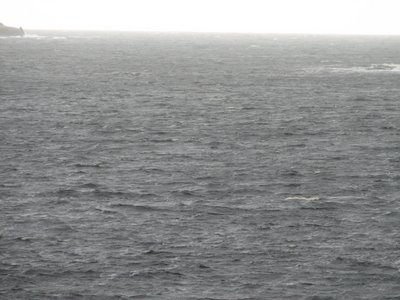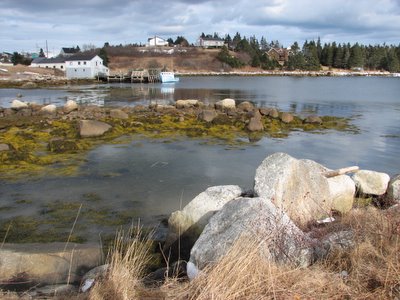Carbon Dioxide and our Ocean Legacy
0 Comments Published by CBEMN on Tuesday, January 30, 2007 at 3:36 PM. Ocean chemistry is a fascinating and important sub-disciple of oceanography because it helps us to better understand potential and actual impacts of climate change. This link provides many useful documents to learn about topics such as ocean acidification.
Ocean chemistry is a fascinating and important sub-disciple of oceanography because it helps us to better understand potential and actual impacts of climate change. This link provides many useful documents to learn about topics such as ocean acidification.
Earth's climate is in crisis. There is no debate; no doubt. The actions that we take today and for the coming decade will determine the fate of our planet. The links between the ocean and climate change can be read here. There is no longer time to discuss impacts. We need to focus on actions and solutions, and we all have the ability to do this. The Intergovernmental Panel on Climate Change will be issuing their first report since 2001 this week. Read what thousands of the world's leading climate change scientists say when it comes out. The United States, Canada and Australia are dragging their feet. The UK is emerging as a leader. Read this to learn about the things our governments and business need and are talking about doing. But we all need to step up independently as well. I pledge, from this day forward, to minimize my impact in every decision and action that I take. I've cancelled a flight to San Fransicso. I was supposed to attend a conference there in April, but I will propose a teleconference instead. I will not be idle and wait for the outcomes, only to know that when my children are grown they will ask the question: "what were you doing about this, mom?"
What are you doing?
I came across this fascinating blog that chronicles the adventures on the yacht Maiken. This post is relevant to this weeks' lectures.
The German weather office is advising people not to go out at all later on today unless absolutely necessary and not to park their cars under trees or by the ocean. In Bavaria meteorologists issued a statement saying that skiing and walks in the woods are "not a good idea".
Read more here.
Read more here.
Did you think you were in the wrong place when this blog showed up on your screen?
I happen to have a very talented Greek friend who designed this for me. So this comes to you all the way from Athens.
I happen to have a very talented Greek friend who designed this for me. So this comes to you all the way from Athens.
GEOG 2305 is an important class today because I will be going over your "major research project". We'll be spending the entire lecture period to go over this in detail.
It certainly appears that El Nino (the warming of the equatorial Pacific Waters) has already peaked in intensity (probably in December), and is now starting to show a steady decline. Whether that steady decline continues is up for debate, but as of right now, we are probably dealing with a weak to slightly moderate El Nino. It is now anticipated that conditions may get back close to neutral by spring. What does this mean for Canada? Well, I think we may already be seeing the effects of a weakening of El Nino with the current pattern change which is trending toward a building West Coast ridge of high pressure which will certainly help dry out British Columbia. That same ridge is also allowing the very cold air from the far north to spill down through the Prairies, while blocking the moist, Pacific air from invading the country . The southern branch of the jet stream is getting supressed well to the south as the northern, polar jet becomes dominant. Eventually, that cold air will be taking up residence across a large portion of eastern Canada starting next week and probably continuing through at least the end of the month, if not longer. The coldest departures from normal will likely be across Ontario and Quebec the second half of this month, then less so as you progress to the east through the Maritimes and Newfoundland. Check out the latest sea surface temperature anomaly animation over the equatorial Pacific which is starting to show signs of a weakening el nino. Notice how the reds and oranges (well above normal water temps) shrink or disappear on the last image from January 3rd, which is indicating a trend of cooler waters being upwelled toward the surface in that region.
"Sea-Fever"
I must down to the seas again,
to the lonely sea and the sky,
And all I ask is a tall ship
and a star to steer her by,
And the wheel's kick
and the wind's song
and the white sail's shaking,
And a grey mist on the sea's face,
and a grey dawn breaking.
I must down to the seas again,
for the call of the running tide
Is a wild call and a clear call
that may not be denied;
And all I ask is a windy day
with the white clouds flying,
And the flung spray
and the blown spume,
and the sea-gulls crying.
I must down to the seas again,
to the vagrant gypsy life,
To the gull's way and the whale's way
where the wind's like a whetted knife;
And all I ask is a merry yarn
from a laughing fellow-rover
And quiet sleep and a sweet dream
when the long trick's over.
By John Masefield (1878-1967).(English Poet Laureate, 1930-1967.)
I remember having to memorize this poem in Grade 5. We can find great understanding of our oceans in written and visual arts, as well as science.
Take a look at this site; it provides a lot of important and useful information related to climate change.
Master Minds Lecture: Have humans wrecked our coasts?
When: Fri 02-Feb-2007 10:30 AM
Where: McCain Arts & Social Sciences Building, Scotia Bank Auditorium"6135 University Avenue, Halifax, NS B3H 4P9
Description: Estuaries and coastal seas are hotspots of diversity and productivity that have attracted people for settlement and resource use since earliest times. Thus, human influences on the near-shore ocean are as old as civilization yet have dramatically accelerated over the past 150-300 years. Dr. Lotze will acquaint us with the history of human-induced changes in 12 estuaries and coastal seas in Europe, North America and Australia using palaeontological, archaeological, historical, fisheries, and ecological data to reconstruct changes in marine mammals, birds, reptiles, fish, invertebrates, seafloor habitats, and water quality through time.
Presented by Heike K. Lotze, Canada Research Chair in Marine Renewable Resources, Department of Biology, Dalhousie University. Dr. Lotze is a marine biologist with strong interest in the human impact on marine species and ocean ecosystems. Her research tries to reconstruct the history of human-induced changes in coastal seas, to disentangle the cumulative effects of multiple human activities, and to analyze the consequences of changes on the structure and functioning of ecosystems. Dr. Lotze has received her PhD in biological oceanography from Kiel University in Germany and came to Dalhousie in 1999 as a post-doctoral fellow. She was awarded the Canada Research Chair in Marine Renewable Resources in 2006. Cost: No charge. RSVP appreciated.Contact: Burgess, Shawna 902-494-6051
When: Fri 02-Feb-2007 10:30 AM
Where: McCain Arts & Social Sciences Building, Scotia Bank Auditorium"6135 University Avenue, Halifax, NS B3H 4P9
Description: Estuaries and coastal seas are hotspots of diversity and productivity that have attracted people for settlement and resource use since earliest times. Thus, human influences on the near-shore ocean are as old as civilization yet have dramatically accelerated over the past 150-300 years. Dr. Lotze will acquaint us with the history of human-induced changes in 12 estuaries and coastal seas in Europe, North America and Australia using palaeontological, archaeological, historical, fisheries, and ecological data to reconstruct changes in marine mammals, birds, reptiles, fish, invertebrates, seafloor habitats, and water quality through time.
Presented by Heike K. Lotze, Canada Research Chair in Marine Renewable Resources, Department of Biology, Dalhousie University. Dr. Lotze is a marine biologist with strong interest in the human impact on marine species and ocean ecosystems. Her research tries to reconstruct the history of human-induced changes in coastal seas, to disentangle the cumulative effects of multiple human activities, and to analyze the consequences of changes on the structure and functioning of ecosystems. Dr. Lotze has received her PhD in biological oceanography from Kiel University in Germany and came to Dalhousie in 1999 as a post-doctoral fellow. She was awarded the Canada Research Chair in Marine Renewable Resources in 2006. Cost: No charge. RSVP appreciated.Contact: Burgess, Shawna 902-494-6051
Today's lecture continues with a more recent historical perspective. The importance of the understanding of the study of historical uses of the marine environment is shown here.
Lecture 1 Outline, Monday, Jan. 8 2007
24 Comments Published by CBEMN on Wednesday, January 03, 2007 at 7:40 AM.- What is ocean science?
- Goals of the course
- History of Ocean Science:
- Ancient uses of the ocean
- Important early developments in the scientific and technological understanding of the oceans and navigation
- Age of European discovery and exploration
- The modern search for scientific knowledge of the oceans




